This is Africa. The power went out before 10 am. It came back on about 6:00 pm, just about the time the water ran out. Fortunately, we had a barrel cleaned out and filled with water earlier in the day, so Anya could wash her hair. I actually helped, for a really mother-daughter bonding experience.
I got up early for morning prayer and was introduced to the students. Dr. Msinjili relayed that I was a former teacher here and my name was Beth Elness, but I’m known as Mama Anya. Ok, I must say that it was encouraging that when they heard “Mama Anya,” there was an audible “Ahh!” from several of the students. They either heard a bit from the past and previous visits, the last being 2013, or the Maasai students thought, “What an auspicious name!” because Anya means “I eat” in Kimaasai.
Anya was awakened by Ciwila bringing another thermos of chai. I found out that this chai is made with the milk produced by the cows which were purchased from money raised by the Cross of Christ Lutheran (my home church) benefit auction. Milk is a staple of the Maasai diet, so now there is more sustainable milk for the students.
Anya went back to sleep, while I did some emails on battery power. It was a morning of putzing around after a long day yesterday: some Kiswahili, some reflections with Anya about yesterday, some tasks like refilling water bottles from our water filter. Rebecca came later with lunch. I think she is planning on feeding Marvin, as we are having quite a bit of left overs. (Rebecca cooked for 12 years for Jean and Marvin.) I tell her this and she laughs. She has a command of English that can joke and understand nuances that most wouldn’t. When I told her that Anya tells me to “chill” sometimes, she replied, “Take a chill pill.” We laughed again. We aren’t making much dent in the left overs either!
I talked with Rebecca about the Pastoralist Women’s Cooperative up by the Kenyan border in Loliondo. It was great to hear her comments about how these women, who are often excluded from decision making and education, while they are forced to be married at young ages and often experience domestic violence. Someday, I want to visit these women, but for this trip, it won’t happen. Check out their website at http://www.pastoralwomenscouncil.org/.
After lunch, we took a walk into Monduli. It takes about half and hour. We went on the southern path through farm fields. I like this path with a great view of the volcanic Monduli mountains and the expansive great rift valley.


However, there is no shade along the way, so it is a bit warmer in mid-day, probably about 76 degrees.
We went to the Tumanini shop to buy a few things. This side of the guest house isn’t very well equipped, so we bought a few things. Here’s the shopping list: TP, paper serviettes (napkins), dish soap, dishwashing brush, dish towel, Cadbury drinking chocolate, and tea bags. We didn’t find the dish brush, so we bought a scrubby thing. We didn’t find dish towels either. With Anya along, it meant we picked up a couple extra things, Fanta Passion in a plastic bottle instead of paying the deposit for the refillable glass bottle, and Eat-Sum-Mor shortbread cookies, imported from South Africa. I should have picked up some ultrapasturized milk pouches for the drinking chocolate. Maybe tomorrow, as I have to go to town again.
Here are some views from our walk
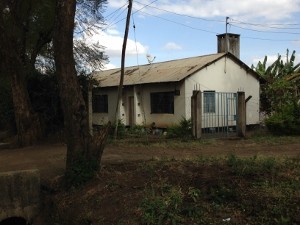
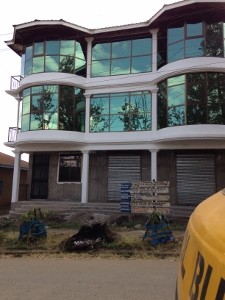
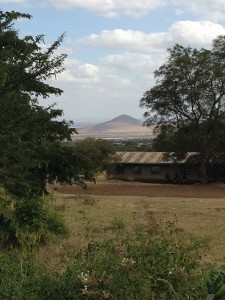
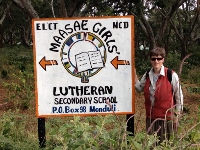
On the way back I met the secretaries leaving the school. One is a friend. (She follows me on Twitter, though I don’t post anything; I just explore what Pope Francis tweets.) I didn’t see her in the morning, but I told her I’ll come tomorrow to greet her.
We got back home, and Anya did some of her algebra 2 homework. Ciwila stopped by to pick up the empty thermos, and we sat on the step and talked for about an hour as the sun started to set. We talked about the Tanzanian Military Academy, as their soldiers were running by us up the mountain for their training. We talked about the university placement system. In this socialistic country, all students are placed by the government into universities. The Tanzania Council of Universities *** system has each university register how many seats they have in each program. Then students indicating three preferences of program and university. Finally, the TCU places students in the open seats according to their National Exam scores. The top students get their top preferences until the seats are filled. Then the subsequent preferences are considered. If the seats are filled, students may end up being placed in programs that they do not want or know anything about. Perhaps they note their preferences for universities with lower tuition rates, but they are place in a more expensive institution. Disturbingly, there is little opportunity to be placed elsewhere. And if one starts the program and doesn’t like it, tough; there is no switching. You only get one chance.
Unfortunately, universities can become lazy under this system. They don’t have to work hard to attract students, as they are guaranteed students as there are more graduates than university places. The students can’t vote with their feet, as they lose their chance for a university education. There is little incentive to improve.
Somehow within this system, the Lutheran church is trying to find partners for a university branch in Monduli. I can’t think of any potential partner who would knowingly donate to a faith-based university where the university can’t select its students. In theory, the government could place a high percentage of Muslims into a Christian institution. While this opens up different opportunities for ministry, it is not the original mission of the university. Crazy!
Ciwila and I also talked about former students and how they are thriving, such as Elizabeth. She told me that one had died last year from burns from cooking. She was the first Hadza (a foraging people group [formerly hunter-gatherer tribe]) to earn a bachelor’s degree, and she was working in community development. What a sad loss. There’s only about 1,000 Hadza remaining, so this is a great loss for the people group. There are about 8 Hadza students at MGLSS. In 2013, Anya and I went on a walking safari with a Hadza guide. If you’ve seen the movie, The Gods Must be Crazy, you have a glimpse of a similar but distinct tribe with the click language. This is an inherently egalitarian society, as foraging women bring more food than the hunting men. They rank a zero on the anthropological technology scale, but they have no history of famine. They don’t even have to carry a water bottle!
We’ve been charging phones. I just talked with Anya, saying, “Isn’t it a bit crazy that we are here in Africa, and we have 5 phones between the 2 of us!” So, this seems crazy, but let me explain. We had our USA phones, but they are locked to service with AT&T, even though they are GSM system that can work in Europe and Africa. It is very expensive to use AT&T in Europe, so, we bought 2 unlocked GSM phones to work in Norway with a Norwegian phone company. Here in Tanzania, again it would be expensive to used our AT&T system, and especially difficult for Tanzanians to call us. So, we bought an older model Nokia phone with a pay-as-you-go system to contact friends in Tanzania. Texting on the keypad is now frustrating, though I used to be pretty good at it in 2002-2004. So, crazy but needed for basic communication with our host country contacts.
Here’s the mystery photo. This thing is on our kitchen wall. What is it?

With blessings,
Beth
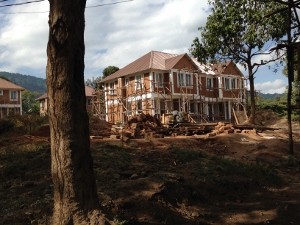
The Hadza grad who died from burns was Upendo Paulo. She had gone to CDTI and had adv. dipl. in Community development. Had the position of Development Officer for the gov. for the Hanang area, living in Dongobesh. So very sad. Left 2 kids without mother.
Fun to be able to read and relate, visualize it all. Looks brown and dry and dusty now. It was very green when we left it in March. I trust you greeted Nangole on our behalf; so sorry we couldn’t come. Did Upendo get home for the event? She’s basically an ‘illegal’, having her student visa expire from Concordia, and has not applied for anything more. Conrad has his green card for working in USA. She probably would not have been able to get back into USA.